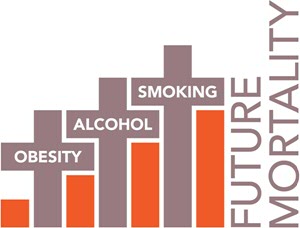Future mortality: integrating smoking, alcohol and obesity

Information concerning future life expectancy is crucial for public policy, social security, pension and insurance schemes, and healthcare planning. However, estimates of future mortality often prove inaccurate, as conventional extrapolative mortality projection methods cannot capture (i) the impact of lifestyle ‘epidemics’, different over time between men and women, and across generations and countries; and (ii) the delay in ageing: the 90-year-olds of today roughly resemble the 80-year-olds of the past.
Mortality forecasting
Key to mortality forecasting is distinguishing between:
(i) the general gradual long-term mortality decline, mainly due to socio-economic factors and associated medical improvements, and accompanied by a delay in ageing expressed as a shift in the age-at-death distribution towards older ages
(ii) The smoking, alcohol, and obesity ‘epidemics’ which cause deviations from and variations in the general mortality decline, and greatly affect premature mortality and the shape of the age-at-death distribution.
Within this project these two components will be included simultaneously in a novel mortality projection methodology with the overall aim to improve the robustness of future mortality estimates for Europe.
Objectives
Key objectives are:
- To assess the past and anticipated future trends in smoking-, alcohol-, and obesity-attributable mortality; and the differences in these trends across countries, sexes, and birth cohorts.
- To assess the roles of both the delay in ageing and changes in the shape of the age-at-death distribution in the gradual long-term mortality trend, and the changes in these roles over time.
- To develop a mortality projection technique that integrates future lifestyle-related mortality trends and future patterns in the age-at-death distribution, and to apply this technique to European populations.
Funding
This project is funded by the Netherlands Organisation for Scientific Research (NWO) (grant no. 452-13-001).
Latest News
On 10 April, Professor in Demography Fanny Janssen from the Faculty of Spatial Sciences, University of Groningen, received the prestigious 2018 Allianz European Demographer Award, which was handed out in at the Allianz Forum in Berlin. Click to read full news item
| Last modified: | 13 December 2018 11.26 a.m. |
